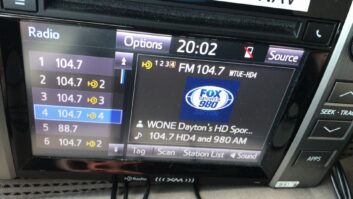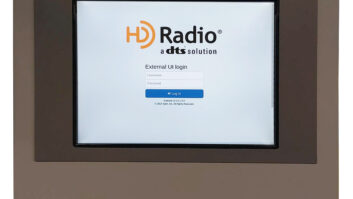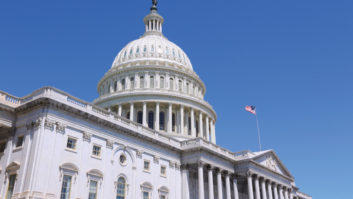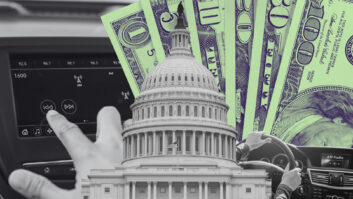Many broadcasters are just realizing that to make the digital transition, they’ll need to pay Ibiquity Digital Corp. software licensing fees in addition to what they will pay manufacturers for new equipment.
This comes as a shock for some executives who have been paying closer attention to day-to-day revenue and debt concerns during the economic downturn than to the likely costs of converting to digital radio.
The fee issue is controversial. The median one-time licensing fee would be about $12,900. At the top end of the scale, a Class C FM could pay about $70,000. Ibiquity also plans to collect 3 percent of yearly station revenues from data services associated with IBOC.
In addition to the costs involved, some radio stations would end up paying fees to Ibiquity, a company owned in part by their group owners – or their competitors.
Some observers wonder if the fee question could delay, if not stop, the IBOC rollout before it gets a foothold.
Although Ibiquity began discussing some aspects of this policy last year, details are emerging from the technology developer and from broadcasters as they begin to discuss the concept.
Like Microsoft
A NAB2001, Ibiquity President and CEO Robert Struble told attendees that his company intended to charge broadcasters licensing fees to use its in-band, on-channel digital audio broadcasting technology.
The fees would be separate from costs to purchase equipment, and would be based on a formula derived from the FCC’s annual regulatory fees.
He likened Ibiquity to Microsoft and said, “We’re a software company. If you buy a transmitter, you’ll need new software from us.”
Charging purchasers for software and upgrades is typical in other industries, such as computers, but it’s a bold concept for broadcasting technology. Typically a station buys a piece of hardware and the financial obligation is finite.
Ibiquity executives say they chose an equitable way to distribute the decade-long development costs for IBOC and that, as part of its business plan, it needs to start generating revenue. “We’re trying to come up with a standard pricing approach. We’ve come up with a model that works across classes of stations,” said Senior Vice President Jeff Jury.
In addition to broadcasters, Ibiquity is working with transmission and receiver companies – transmitter manufacturers and transmission-related equipment makers, as well as receiver component makers, chip manufacturers and automakers.
Will broadcasters accept the fees?
Part of the answer may lie in Ibiquity’s ownership and business partners. Company shareholders include most of the major broadcast groups. It has licensing agreements with transmitter manufacturers Broadcast Electronics, Harris and Nautel, and with receiver manufacturers Kenwood, Harmon Kardon and Visteon. Ford recently took an undisclosed equity position in Ibiquity. In addition to broadcast stockholders, Ibiquity also has Wall Street investors who presumably want a quick return on their investment.
Ibiquity has spent millions developing IBOC technology and expects to recoup those costs, as does its equipment partners.
“Everybody from each sector would say, ‘Charge the other guy'” in recouping costs, said Jury. “We’re trying not to burden any one sector.”
Why now?
Some broadcasters familiar with the station fee plan assume Ibiquity wants to charge stations now because it cannot wait to recoup costs from its portion of the IBOC receiver sales.
When asked about the timing, Jury said, “As a business, we can’t just keep never making money. We need the money now in the sense that we’re starting the rollout now.”
He said the company won’t become succeed only from broadcast license fees, that eventually it will make most of its income through receiver sales.
The fees work like this: Annual FCC regulatory fees for radio stations range from $250 to $4,550 based on station service, power class and size of population served. A station would pay Ibiquity a one-time licensing fee calculated as 15 times its annual FCC regulatory fee.
Thus the range for a one-time perpetual license would be roughly $3,750 to $68,250. Ibiquity says the median one-time licensing fee would be about $12,900. Stations also could choose to pay over a 10-year period. (See “IBOC Q&A”, page X.)
“If you look at those numbers, I don’t think it’s an onerous amount to pay for digital radio,” said Jury.
‘Stumbling block’
Some broadcasters feel differently.
Members of Ibiquity’s own broadcast advisory rollout board, made up of owners and engineers, advised against the fee system.
“They’re going to have to come up with a plan for broadcasters to buy a new transmitter, pay, and be done with it at that point,” said one member, who characterized the fees as a “major stumbling block” in the rollout.
“I don’t think they’ve thought them through,” said another advisory board member. “If they’re trying to entice broadcasters to go digital and require us to spend on average $150,000 just on the hardware, it certainly reduces our enthusiasm.
“If they were looking to encourage development, at a minimum, they would defer software payments for a year or two, so we wouldn’t take a hit all in one year.”
One broadcaster not on the advisory board said that if his company were asked to cut a licensing check today for all the stations they plan to convert this year, the total would be $1 million.
“There’s no company that has a million unallocated,” he said.
Noncommercial stations are exempt from the FCC’s regulatory fees, so they would pay the lowest IBOC licensing fees. But some of them protest the levies as well.
In comments submitted to the FCC about the National Radio Systems Committee report on Ibiquity’s FM IBOC system, the Rocky Mountain Corporation for Public Broadcasting wrote that its stations are “outraged at this unprecedented use fee plan.”
One unnamed manager wrote to the FCC, “I think it is unconscionable that they are asking the FCC to adopt their sole technology as the only system and then charge every station an annual use fee on top of the fees you will already pay to Harris etc. that will be built into their digital equipment if and when you decide to buy their transmitter.”
One noncommercial manager said, “This is going to kill noncommercial stations.” He added that public radio stations, which typically vie with public TV for grant funds for equipment purchases, face added pressure from TV’s mandated digital conversion.
‘The most sense’
Some commercial station sources pointed out that not all noncoms have the same resources and felt those stations also should be charged a sliding scale. Other commercial sources did not begrudge the noncoms getting the lowest fee.
When asked about the concept, Jury said Ibiquity decided the model it developed “made the most sense.”
Ibiquity has been discussing the fee plan with its investor broadcasters and other station owners, distributing “Memorandums of Understanding,” precursors to contracts.
Several broadcasters who spoke to Radio World suspect the Ibiquity fees are up for negotiation and hope to see them reduced or delayed. It’s not clear if any have signed licensing fee contracts with Ibiquity, which considers that information confidential.
Some broadcasters think early adopters might get a break. But other broadcast sources don’t believe there are deals to be had. Some feel that the biggest groups, Clear Channel or Infinity, would negotiate the terms and that all other groups and individual stations would need to fall in line.
One such source said his company lawyer termed Ibiquity’s memorandum language “weasel wording that will be meaningless in negotiating.”
Ibiquity says there will be no deals, not for its investor broadcast groups, nor for early adopters, and that there will be no bulk station discounts.
“What we’re trying to do is put information out there that we plan to stick to,” said Jury. “It doesn’t make sense if we change it for each person. We think that this pricing model, which is fair, already takes that into account,” said Jury.
He said the fee concept has been in its business model for several years. Executives had discussed passing through its development costs onto the equipment costs, as suggested by some broadcasters, but decided the licensing fee system was more equitable.
Manufacturers close to IBOC development disagreed on whether licensing fees could impede the rollout.
Data fees
Another part of the fee plan concerns revenues stations would make from ancillary data services potentially possible using IBOC technology. Ibiquity wants 3 percent annually from station revenues generated from the IBOC data services.
How Ibiquity intends to police this is unclear. The situation invites stations to hide such revenue, sources said. Others said it might be difficult for commercial stations even to calculate their data revenue if, for example, they had given data services to advertisers as a value-added item.
Sources said Ibiquity’s memorandum states that it has the right to audit station books twice a year to determine the real revenue from the data services, something some companies strongly oppose. Although Jury would not confirm or deny this language, he said it would not be unusual for such a software fee license contract.
“We’re not trying to get into people’s books, we’re trying to get into the data business.” He said the process of calculating revenue from data is a “gray area” that would have to evolve. Observers said Ibiquity may demand the right to audit a station’s books but that doesn’t mean the company would actually do it, and termed the language standard contract boilerplate. Another gray area is how a station would pay for upgrades.
Theoretically, the fee only gives the station the right to use the software in the gear at the time of purchase. An upgrade could require another licensing fee.
This situation is still under discussion at the company. Ibiquity doesn’t want to alienate purchasers by charging for software upgrades immediately.
Another question is what happens when a station is sold. Would the terms of the licensing agreement remain with the facility? It’s pertinent, as the FCC processes 3,000 to 4,000 radio transaction applications each year.
Several sources hoped the FCC would question Ibiquity about the licensing fee issue, but a source close to the commission said he doubted the agency would “put a wet blanket on this transition by getting into the fees.”
Similarly, the NAB and NRSC do not have a position on the fees.












